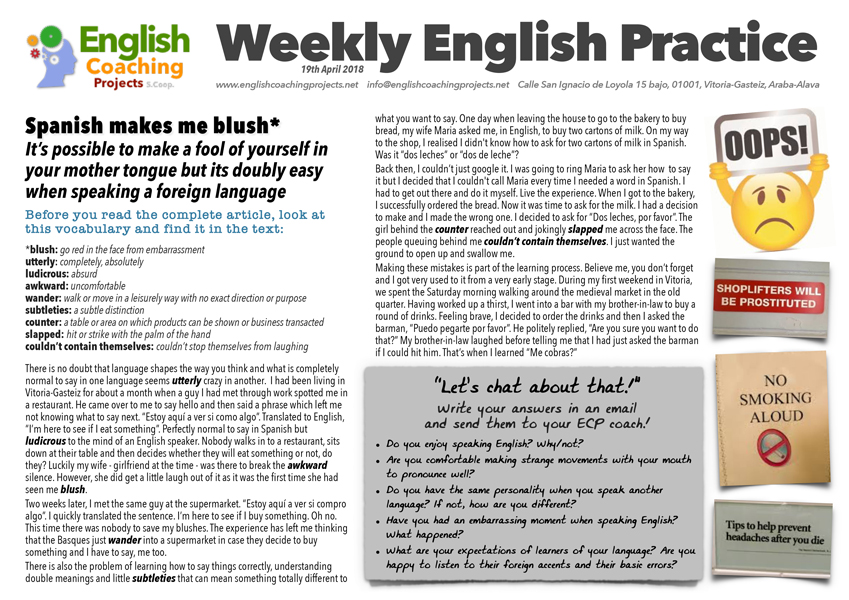Click on the image to download the pdf
It’s possible to make a fool of yourself in your mother tongue but its doubly easy when speaking a foreign language
Before you read the complete article, look at this vocabulary and find it in the text:
*blush: go red in the face from embarrassment
utterly: completely, absolutely
ludicrous: absurd
awkward: uncomfortable
wander: walk or move in a leisurely way with no exact direction or purpose
subtleties: a subtle distinction
counter: a table or area on which products can be shown or business transacted
slapped: hit or strike with the palm of the hand
couldn’t contain themselves: couldn’t stop themselves from laughing
There is no doubt that language shapes the way you think and what is completely normal to say in one language seems utterly crazy in another. I had been living in Vitoria-Gasteiz for about a month when a guy I had met through work spotted me in a restaurant. He came over to me to say hello and then said a phrase which left me not knowing what to say next. “Estoy aquí a ver si como algo”. Translated to English, “I’m here to see if I eat something”. Perfectly normal to say in Spanish but ludicrous to the mind of an English speaker. Nobody walks in to a restaurant, sits down at their table and then decides whether they will eat something or not, do they? Luckily my wife – girlfriend at the time – was there to break the awkward silence. However, she did get a little laugh out of it as it was the first time she had seen me blush.
Two weeks later, I met the same guy at the supermarket. “Estoy aquí a ver si compro algo”. I quickly translated the sentence. I’m here to see if I buy something. Oh no. This time there was nobody to save my blushes. The experience has left me thinking that the Basques just wander into a supermarket in case they decide to buy something and I have to say, me too.
There is also the problem of learning how to say things correctly, understanding double meanings and little subtleties that can mean something totally different to what you want to say. One day when leaving the house to go to the bakery to buy bread, my wife Maria asked me, in English, to buy two cartons of milk. On my way to the shop, I realised I didn’t know how to ask for two cartons of milk in Spanish. Was it “dos leches” or “dos de leche”?
Back then, I couldn’t just google it. I was going to ring Maria to ask her how to say it but I decided that I couldn’t call Maria every time I needed a word in Spanish. I had to get out there and do it myself. Live the experience. When I got to the bakery, I successfully ordered the bread. Now it was time to ask for the milk. I had a decision to make and I made the wrong one. I decided to ask for “Dos leches, por favor”. The girl behind the counter reached out and jokingly slapped me across the face. The people queuing behind me couldn’t contain themselves. I just wanted the ground to open up and swallow me.
Making these mistakes is part of the learning process. Believe me, you don’t forget and I got very used to it from a very early stage. During my first weekend in Vitoria, we spent the Saturday morning walking around the medieval market in the old quarter. Having worked up a thirst, I went into a bar with my brother-in-law to buy a round of drinks. Feeling brave, I decided to order the drinks and then I asked the barman, “Puedo pegarte por favor”. He politely replied, “Are you sure you want to do that?” My brother-in-law laughed before telling me that I had just asked the barman if I could hit him. That’s when I learned “Me cobras?”
“Let’s chat about that!”
Write your answers in an email and send them to your ECP coach!
- Do you enjoy speaking English? Why/not?
- Are you comfortable making strange movements with your mouth to pronounce well?
- Do you have the same personality when you speak another language? If not, how are you different?
- Have you had an embarrassing moment when speaking English? What happened?
- What are your expectations of learners of your language? Are you happy to listen to their foreign accents and their basic errors?


